Preface
Goal: Utilizing JQ in BASH for string processing.
Instead of using pure bash,
we can directly extract data in json format using jq.
For convenience,
we can combine the output of jq command,
to bash for further processing.
Reference Reading
Source Examples
You can obtain source examples here:
Common Use Case
Task: Get the unique tag string
Please read overview for more detail.
Data Structure Support
We are going to use external json file.
Prepopulated Data
Songs and Poetry
The data is simply a json file.
{
"songs": [
{ "title": "Cantaloupe Island",
"tags": ["60s", "jazz"]},
{ "title": "Let It Be",
"tags": ["60s", "rock"]},
{ "title": "Knockin' on Heaven's Door",
"tags": ["70s", "rock"]},
{ "title": "Emotion",
"tags": ["70s", "pop"]},
{ "title": "The River"}
]
}JQ in BASH Solution
The Answer
We are going to combine JQ with other tools in BASH.
jq -r "(.songs[].tags | \
select( . != null ))[]" \
songs.json \
| sort \
| uniq \
| tr '\n' ' 'Enough with introduction, at this point we should go straight to coding.
Environment
No need any special setup. Just run and voila..!
1: Array in JQ
We are going to check how far associative array in bash,
can handle data structure.
Simple Array
Consider begin with simple array.
json='{
"tags": [
"rock", "jazz", "rock", "pop", "pop"
]
}'
tags=$(echo $json | jq -r .tags[])
echo ${tags[@]}With output result as below:
❯ ./01-tags.sh
rock jazz rock pop pop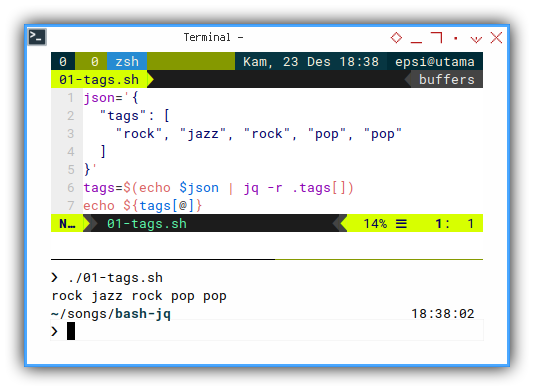
No problem so far.
Associative Array
Instead of using interal data,
we better go straight to json file as below:
{
"title": "Cantaloupe Island",
"tags": ["60s", "jazz"]
}Now consider this form.
jq -r .title song.json
jq -r .tags song.jsonWith output result as below:
❯ ./02-song.sh
Cantaloupe Island
[
"60s",
"jazz"
]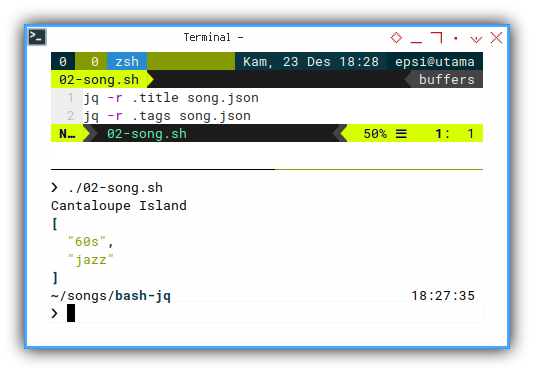
We still have no problem with code above. But unfortunately we cannot go further than this.
2: Songs JSON
We need to prepare our song json.
Records in Songs JSON
The json data is simply as shown below:
{
"songs": [
{ "title": "Cantaloupe Island",
"tags": ["60s", "jazz"]},
{ "title": "Let It Be",
"tags": ["60s", "rock"]},
{ "title": "Knockin' on Heaven's Door",
"tags": ["70s", "rock"]},
{ "title": "Emotion",
"tags": ["70s", "pop"]},
{ "title": "The River"}
]
}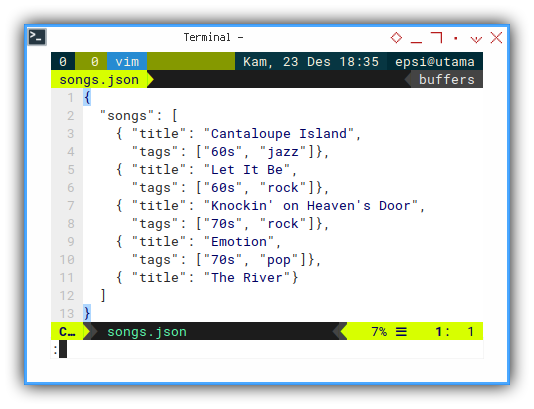
Testing JQ Result
Now we can have a very short code. With the result exactly the same as above code:
title=$(jq -r .songs[1].title songs.json)
echo $title
tags=( $(jq -r .songs[1].tags[] songs.json) )
echo ${#tags[@]}
echo ${tags[@]}With the result as below lines of string.
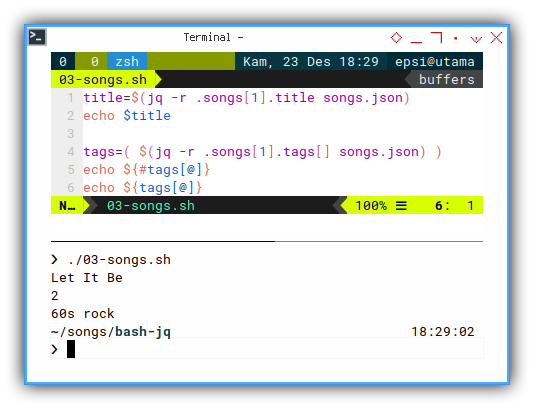
❯ ./03-songs.sh
Let It Be
2
60s rock3: Finishing The Task
Extract, Flatten, Unique
Extracting Data Structure
Based on the result above,
we can go further, extracting the tags data.
We need to filter lines without tags. And get rid of it.
path='.songs[].tags'
remove='select( . != null )'
jq -r "$path | $remove" songs.json[] With the result of array of array, as shown below.
❯ ./04-extract.sh
[
"60s",
"jazz"
]
[
"60s",
"rock"
]
[
"70s",
"rock"
]
[
"70s",
"pop"
]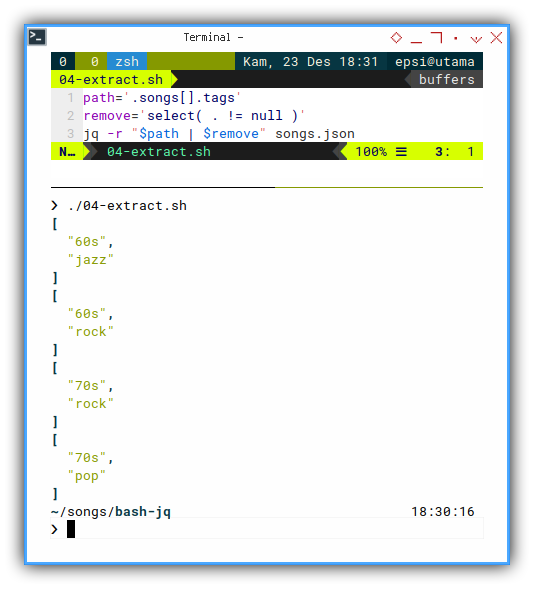
Notice how we remove the unwanted record.
remove='select( . != null )'Flatten
Now we can normalize, the separated values. Flatten all values into just single array.
Using two loops. One after another.
path='.songs[].tags'
remove='select( . != null )'
tags=$(jq -r "($path | $remove)[]" songs.json)
echo ${tags[@]}With the result of a flattened array shown below.
❯ ./05-flatten.sh
60s jazz 60s rock 70s rock 70s popFlatten Rewrite
We can also rewrite the variable in bash, so the code can become more readable. Although it is not necessary.
join='., " "'
path='.songs[].tags'
remove='select( . != null )'
filter="($path | $remove)[] | $join"
tags=$(jq -r "$filter" songs.json)
echo ${tags[@]}With the result exactly the same as previous flattened array.
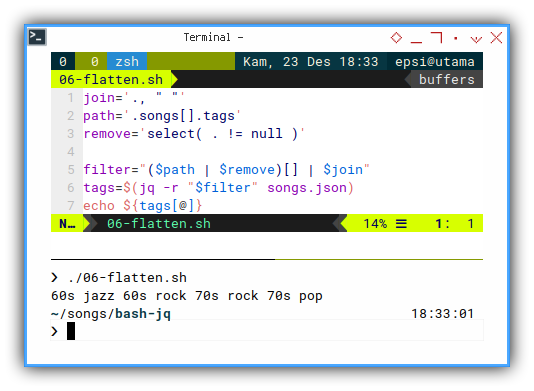
Unique
Instead of solving the approach using pure jq,
I prefer to use other tools as necessary.
jq -r "(.songs[].tags | \
select( . != null ))[]" \
songs.json \
| sort \
| uniq \
| tr '\n' ' 'With the result similar as below array:
❯ ./06-uniq.sh
60s 70s jazz pop rock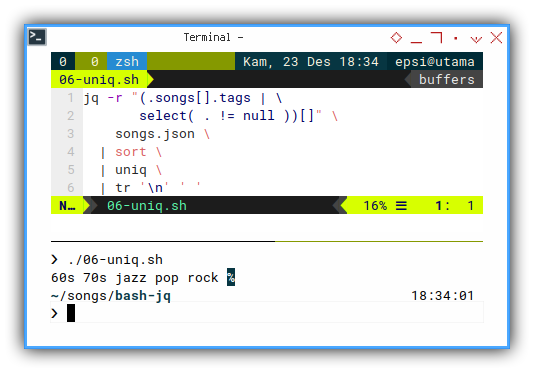
It is so easy to learn, if you willing to read the offical documentation.
That is all.
What is Next 🤔?
Consider continue reading [ Awk - Playing with Records ].